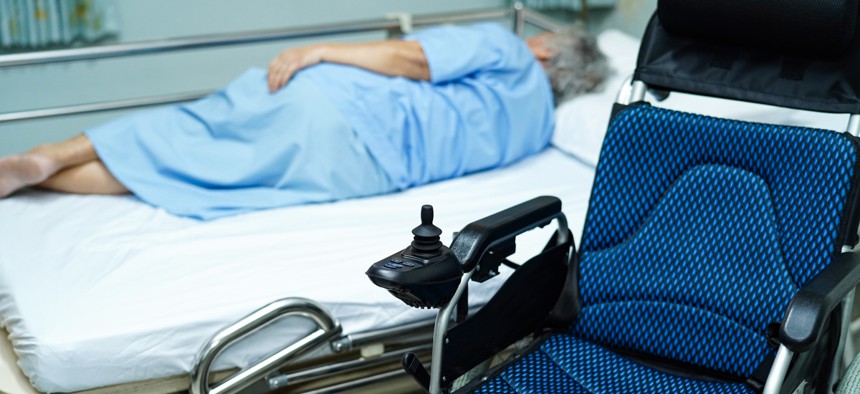Pennsylvania Attorney General Opens Criminal Investigations Into Nursing Homes Deaths

Nursing home residents have made up two-thirds of the deaths due to coronavirus in Pennsylvania. Shutterstock

Connecting state and local government leaders
State Attorney General Josh Shapiro says he wants to determine if management is at fault for the thousands of residents who have died in his state.
Coronavirus took an early and persistent hold in nursing homes across the country, leading to thousands of residents and staff contracting the respiratory illness and forming the hotspots that led to wider community transmission.
Since the first outbreak vector appeared in a nursing home in Kirkland, Washington, officials have watched elderly care facilities with increasing vigilance. This week, the Pennsylvania attorney general took his monitoring a step farther, saying he is launching a criminal investigation into possible mismanagement and neglect of residents that could have led to their deaths.
Across the country, 7,500 long-term care facilities have confirmed cases involving more than 143,000 residents and staff. Deaths due to coronavirus among elderly residents and care staff have climbed to over 25,600, accounting for more than a third of U.S. deaths from the pandemic.
The picture for nursing homes in Pennsylvania is particularly grim. The virus has been confirmed in almost 12,000 residents of 540 nursing homes in the state. Those who died from the virus make up more than two-thirds of the state’s 3,943 deaths, as of Wednesday afternoon.
Attorney General Josh Shapiro did not specify how many facilities are being investigated. “While we salute and appreciate nursing home staff on the front lines during this pandemic, we will not tolerate those who mistreat our seniors and break the law,” Shapiro said in a statement. “We will hold nursing facilities and caretakers criminally accountable if they fail to properly provide care to our loved ones.”
Adam Marles, the president of LeadingAge PA, an organization that represents several hundred nursing homes in the state, said in a statement that the group “will continue to support … members, their front line workers and residents during any investigation.”
State attorneys general in other states have also launched nursing home probes, from a similar criminal investigation into possible abuse or mistreatment in New Jersey to a civil investigation into complaints that nursing home staff have not adequately communicated with residents’ families in New York. In New Mexico, the state attorney general is examining management practices in at least one nursing home where staff members were not required to wear gloves or enforce social distancing with residents.
In Washington state, the nursing home that became one of the earliest epicenters of the coronavirus outbreak in the United States now faces a fine of more than $600,000 after the state Department of Social and Health Services found that the facility failed to control the virus as it spread and did not provide its residents with quality care.
The criminal investigations in Pennsylvania arrived at the same time that the state announced new testing procedures for nursing homes and other long-term care facilities. Facilities with confirmed cases of the virus are being asked to test all residents and staff, and those without cases are being asked to test at least 20% of residents weekly. It is unclear whether facilities with confirmed cases will also have to test weekly, as the state guidance does not specify that, but Gov. Tom Wolf told reporters on Tuesday that testing would be done “once a week for everybody — employees and patients and clients.”
Dr. Rachel Levine, Pennsylvania’s health secretary, said that regular testing will provide the state with a warning system moving forward, allowing them to more quickly identify possible vectors of community transmission. “By testing every resident and every staff member in every nursing home, we will be able to pinpoint exactly who has Covid-19, who has been exposed but has no symptoms, and cohort positive cases to prevent further spread,” Levine said.
The new plan has been welcomed by some in the state legislature who previously criticized Wolf, a Democrat, and his administration for not doing enough to protect elderly residents. But for others, the plans have simply taken too long to be implemented. State Sen. John Yudichak, who is not affiliated with a political party, said the same system could have been put in place weeks ago. “While other states were ramping up testing in nursing homes and were transparent in granting access to the public about Covid-19 deaths occurring in those facilities, Pennsylvania’s nursing homes had been forgotten about in our war against Covid-19,” he said in a statement. “Nine weeks without a robust plan is far too long.”
Other states have also recently implemented universal testing in nursing homes, including Maryland, New York, and New Jersey, all states that have seen significant outbreaks in elderly care facilities.
For their part, nursing homes leaders across the country earlier in the pandemic did plead with officials for greater testing capacity and more supplies, a call that went ignored in some places until the past few weeks. During an appearance on CNN in early April, Mark Parkinson, the head of the National Center for Assisted Living, the largest U.S. nursing home association, said that the country needs to “rally around nursing homes and assisted living buildings the same way it has around hospitals” to ensure they get the equipment they need.
“We feel like we’ve been forgotten,” Parkinson said. “We adore the hospital workers. They’re heroes and we completely support that, but the frontlines are nursing homes … If we don’t stop it in nursing homes, we’re not going to stop it in hospitals. So far, the country just hasn’t figured that out.”
Emma Coleman is the assistant editor for Route Fifty.

NEXT STORY: What US states can learn from COVID-19 transition planning in Europe





